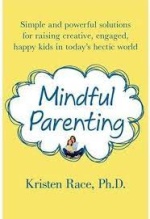Mindful Parenting
March 30, 2024
Quote of the Week
"Wherever you are, be there totally." --Eckhart Tolle
Mindful Parenting
 Being a parent loads you with so many responsibilities that it may surprise you to hear that after keeping your child physically safe and cared for, your top responsibility is yourself. But it's true. Being a parent is just plain hard, and guaranteed to push your buttons. So your #1 responsibility as a parent is to support yourself so that you can self-regulate. And the foundation of self-regulation is mindfulness.
Being a parent loads you with so many responsibilities that it may surprise you to hear that after keeping your child physically safe and cared for, your top responsibility is yourself. But it's true. Being a parent is just plain hard, and guaranteed to push your buttons. So your #1 responsibility as a parent is to support yourself so that you can self-regulate. And the foundation of self-regulation is mindfulness.
Mindfulness simply means that you bring your conscious attention to your experience, in a non-judgmental, accepting way. When you become more aware of your own feelings, thoughts, and body sensations, you gain more ability to CHOOSE your response to what's happening, instead of getting hijacked by your emotions. That's essential if we want to be the patient, emotionally generous parents that every child needs. After all, you may know great parenting skills or strategies, but you can't use them if you're not calm and centered. [...] Instead, if we can stay mindful—meaning we notice our emotions but make a conscious, responsible choice about how to act on them—we model emotional regulation, and our children learn from watching us. Read more in this week's featured article.
Reading Corner
 Title: Mindful Parenting: Simple and Powerful Solutions for Raising Creative, Engaged, Happy Kids in Today’s Hectic World
Title: Mindful Parenting: Simple and Powerful Solutions for Raising Creative, Engaged, Happy Kids in Today’s Hectic World
By: Kristen Race
Ages: Adult
"A mindful approach to parenting that helps children (and their parents) feel happier, healthier, calmer, and less stressed in our frenetic era. Rooted in the science of the brain, and integrating cognitive neuroscience and child development, Mindful Parenting is a unique program that speaks directly to today's busy families who make up what Dr. Race calls "Generation Stress." Research has shown that mindfulness practices stimulate the prefrontal cortex of the brain. Regular stimulation of this part of the brain helps us feel happier, healthier, calmer, less anxious, less stressed, and makes it easier for us to concentrate and think clearly--the very behavior we are hoping our children will display." --Publishers
Be the Change
This week when faced with a tough parenting challenge, try the NAP technique.
Here are the steps:
- Notice and observe the painful sensations in your body and any accompanying thoughts as they show up.
- Allow it all to be just as it is, without trying to change anything.
- Pass the pain on through, rest into the moment until your painful thoughts and feelings pass through and away from you.
The next time you find yourself having difficulty with your children, in whatever way that shows up for you, give this acceptance practice a try. You can read more here.





